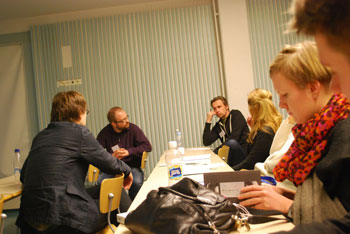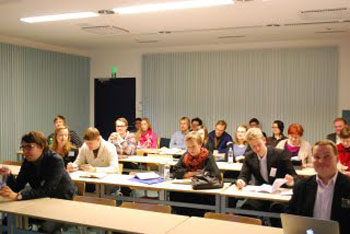Do we have a lack of imagination when it comes to political research, or is there a danger of developing theologies which forget the human? These are the two highlights which captured my ear during the keynote speech of Professor R.B.J. Walter in the opening of Finnish Political Science Association Convention arranged 7–8. 3.2013 in the University of Lapland, Rovaniemi.


An answer to this challenge was searched in the Political Economy Panel which gathered together researches from different universities and fields of study, who had a common interest in political economy. Panel’s chair Teppo Eskelinen from the University of Eastern Finland stated that the special interest in arranging the panel was to collect dispersed field of research into the same room to map, how does the research concerning political economy made in Finland look like. Four presentations given by Petri Räsänen (University of Tampere), Lauri Holappa and Elina Aaltio (University of Helsinki), and I (University of Lapland), set an interesting starting point for ongoing conversation which didn’t forget the human or lack imagination.
Even though every presenter had a limited time to draw their main arguments, panel gave a cross-section from more general level to marginal field of study. Räsänen delivered comparison between economy and democracy where instead of pure rationality economy is understood as process where different human interests, practices and morality, in other words politics, occur. Holappa investigated how the division of power relates to the ways how markets organize and the ideological power defines the spaces of actions. Here the money is the instrument of transition, trust and responsibility. Aaltio looked into how productivity discourses and indicators in social politics shape the reality by describing it but simultaneously participating the process which it describes. This performativity of economics reminds a self-fulfilling prophesy which takes place not only in the future but also here and now. In later conversation concerning my presentation Eskelinen underlined the dilemma if the transparency of economic production, usually considerate as good development, could actually emerge as violence.
How does the research on political economy in Finland look like then? The question was addressed in the end of the panel and in their point of view it seemed that emphasis on term ‘ideology’ was strong. It seemed to be the centerpiece to be able to provide critical approach instead of reproducing the present state of economics and societies. In other words the impact of ideologies should not be forgotten in the research of political economy to keep the imagination and the human in mind.
Do we need a research society for political economy in Finland? There seemed to be a drive for new kind of cooperation between different makers of research within this field. It is a challenge and takes a lot of effort to make a research society to flourish, but more importantly than forming a solid body for a specific research field which to identify oneself with, is to continue with evolving a new network of political economy, breaking the boundaries of different universities and disciplines to provide a new kind of humanistic imagination in the field of economies. One can take a heed and look what the ‘Economics of Fear’ has to offer into this conversation: http://filosofia.fi/node/6425.
Text by Joonas Vola